九年级过去完成时用法讲解复习课程
- 格式:doc
- 大小:35.00 KB
- 文档页数:9


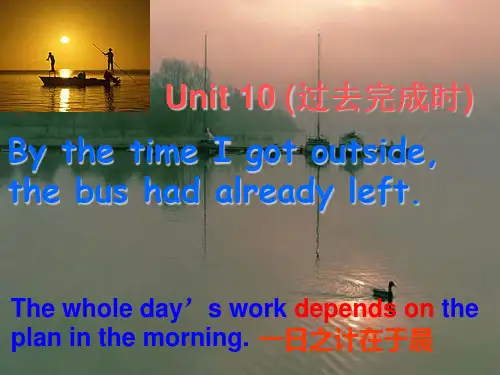
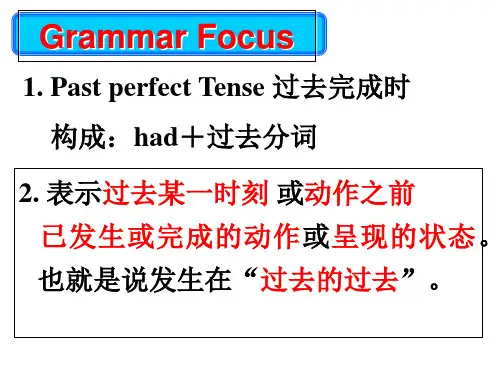
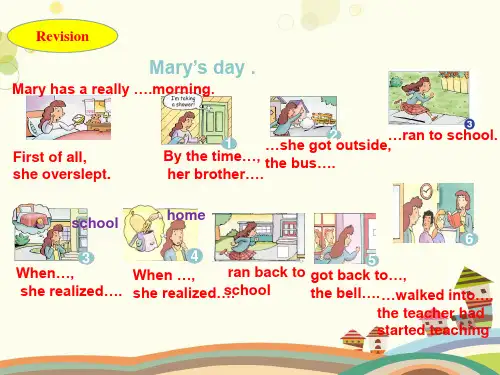
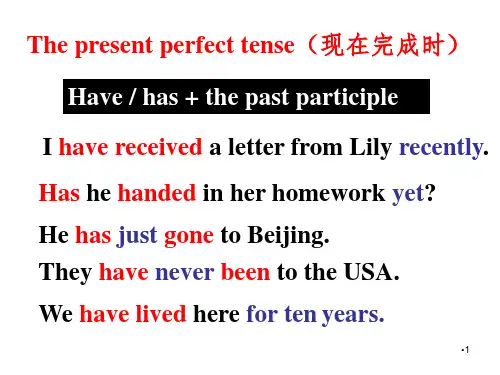
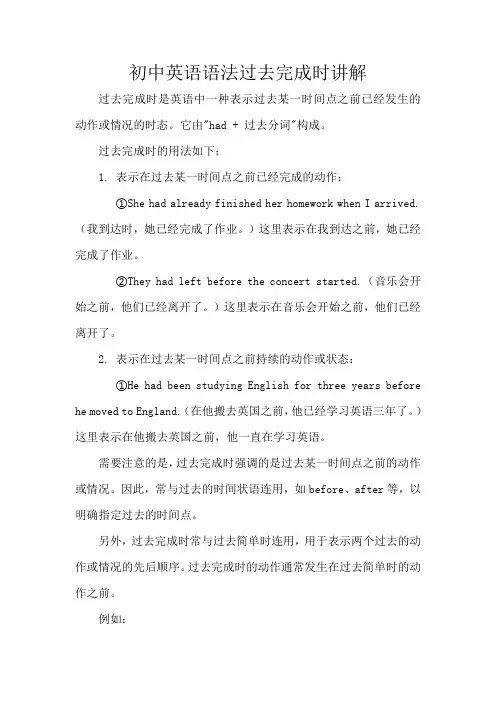
初中英语语法过去完成时讲解过去完成时是英语中一种表示过去某一时间点之前已经发生的动作或情况的时态。
它由"had + 过去分词"构成。
过去完成时的用法如下:1. 表示在过去某一时间点之前已经完成的动作:①She had already finished her homework when I arrived.(我到达时,她已经完成了作业。
)这里表示在我到达之前,她已经完成了作业。
②They had left before the concert started.(音乐会开始之前,他们已经离开了。
)这里表示在音乐会开始之前,他们已经离开了。
2. 表示在过去某一时间点之前持续的动作或状态:①He had been studying English for three years before he moved to England.(在他搬去英国之前,他已经学习英语三年了。
)这里表示在他搬去英国之前,他一直在学习英语。
需要注意的是,过去完成时强调的是过去某一时间点之前的动作或情况。
因此,常与过去的时间状语连用,如before、after等,以明确指定过去的时间点。
另外,过去完成时常与过去简单时连用,用于表示两个过去的动作或情况的先后顺序。
过去完成时的动作通常发生在过去简单时的动作之前。
例如:①She had finished her homework before she went to bed.(她在睡觉前已经完成了作业。
)②They had already left when I arrived at the party.(当我到达派对时,他们已经离开了。
)总结起来,过去完成时用于表示过去某一时间点之前已经发生的动作或情况,常与过去的时间状语连用,以明确指定过去的时间点。
同时,过去完成时通常与过去简单时连用,以表示两个过去的动作或情况的先后关系。

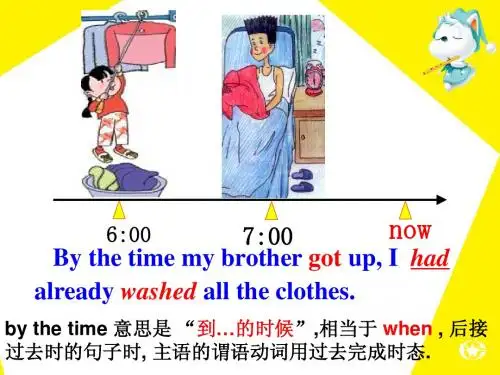
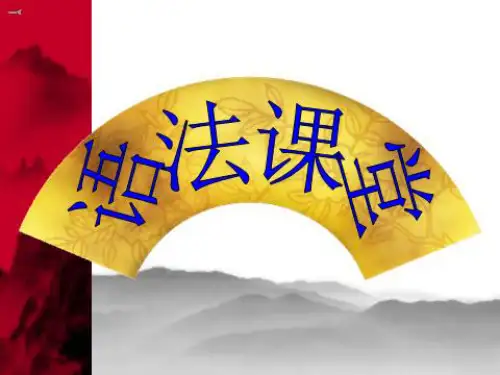
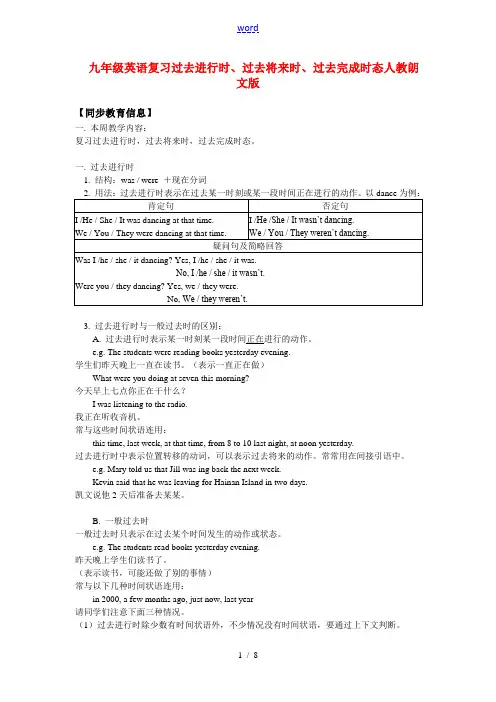
九年级英语复习过去进行时、过去将来时、过去完成时态人教朗文版【同步教育信息】一. 本周教学内容:复习过去进行时,过去将来时,过去完成时态。
一. 过去进行时1. 结构:was / were +现在分词3. 过去进行时与一般过去时的区别:A. 过去进行时表示某一时刻某一段时间正在进行的动作。
e.g. The students were reading books yesterday evening.学生们昨天晚上一直在读书。
(表示一直正在做)What were you doing at seven this morning?今天早上七点你正在干什么?I was listening to the radio.我正在听收音机。
常与这些时间状语连用:this time, last week, at that time, from 8 to 10 last night, at noon yesterday.过去进行时中表示位置转移的动词,可以表示过去将来的动作。
常常用在间接引语中。
e.g. Mary told us that Jill was ing back the next week.Kevin said that he was leaving for Hainan Island in two days.凯文说他2天后准备去某某。
B. 一般过去时一般过去时只表示在过去某个时间发生的动作或状态。
e.g. The students read books yesterday evening.昨天晚上学生们读书了。
(表示读书,可能还做了别的事情)常与以下几种时间状语连用:in 2000, a few months ago, just now, last year请同学们注意下面三种情况。
(1)过去进行时除少数有时间状语外,不少情况没有时间状语,要通过上下文判断。
e.g. I went to bed very late last night. I was reading a novel and forgot the time.昨天晚上我上床很晚,我正在看一本小说而忘记了时间。
九年级英语复习一般过去时和现在完成时人教朗文版【同步教育信息】一. 本周教学内容:复习一般过去时和现在完成时一. 一般过去时:1. 一般过去时表示过去某个时间发生的动作或情况,既可能是一次性的动作,也可能是经常反复发生的动作,常与这些时间状语连用,如:yesterday, the day before yesterday, last week, last year, in 2000, a few days ago, just now, in the past 等等。
e.g. Jack saw a film last week.Where did the students go yesterdayDid the teachers climb the hill a few days agoIn the past, people lived a miserable life in China.2. 有些情况发生的时间并不确定,但是,只要是过去发生的(与现在无关的)要用过去时。
e.g. How did your father like AustraliaWhat happened when the students were running around the playground3. 在条件和时间状语从句中用一般过去时表示过去将来的动作e.g. The doctor told me he would operate on my mother if the lights were bright enough.医生说,如果灯够亮,他就给母亲动手术。
The teacher said that she would have a quiz as soon as everyone got ready.老师说大家一准备好她就进行测验。
注意:(1)在一般过去时中行为动词用过去式,没有人称和数的变化。
(2)动词be在第1、3人称单数中用was,其他人称都用were.(3)动词的过去式有规则和不规则的变化,规则变化的过去式以study为例,牢记不规则变化的过去式。
九年级过去达成时用法解说1、归纳过去达成时表示过去某一时间或动作以前已经发生或达成了的动作。
它表示动作发生的时间是“过去的过去” 。
表示过去某一时间可用by, before等构成的短语,也可用when, before等引导的从句或经过上下代表示。
His eyes shone brightly when he finally received the magazine he had long expected.当她终于收到她希望已久的杂志时,她愉悦得两眼闪光。
By the time he was twelve, Edison had begun to make a living by岁时,爱迪生就开始自己生活。
2、构成过去达成时由“助动词had+过去分词”构成。
其否定式、必定式、疑问式以下表:必定式 had +PP否定式had+not PP疑问式Had...PP注意: had not常简单为hadn't 。
They asked me to have a drink with them and said it was at least ten years sinceI had enjoyed a good drink.他们请我和他们一起喝酒,并说我自前一次喝酒到现在最少十年了。
We had learnt 30 lessons by the end of last month.到上个月尾为止,我们已经学了30 课。
He said we hadn’t seen each other since I left Beijing.自从我走开北京,我们还没见过面。
3、过去达成时的用法过去达成时的主要用法和现在达成时相同。
不相同的是,过去达成时把时间推移到了过去某一时间以前,与现在没关。
(1)过去达成时表示在过去某一时间或动作以前已经达成了的动作。
这个过去的时间状语有 by, before等介词短语或when, before等引导的从句。
九年级英语13课知识点总结九年级英语13课是我们在初中英语教学中的重要一课,主要包括对过去完成时态的学习。
以下是对该课知识点的总结和探讨。
一、过去完成时态的用法过去完成时态表示在过去某一时间发生的动作或者情况之前已经完成的动作或情况。
其结构为had + 过去分词。
比如,I had finished my homework before my mother came back.(在我妈妈回来之前,我已经完成了作业。
)该时态用于描述两个已经发生的动作之间的先后关系,可以帮助我们更清晰地表达过去发生的事件。
二、过去完成时态的标志词在句中,过去完成时态与一些特定的标志词常常结合使用,以表明过去完成时态的使用情况。
比如,already, never, just, ever, before等词汇。
例如,He had already left when I arrived.(当我到达时,他已经离开了。
)三、过去完成时态的否定和疑问形式过去完成时态的否定形式为:had not + 过去分词,缩写为hadn't。
例如,They hadn't finished their work when the teacher came in.(当老师进来时,他们还没有完成工作。
)过去完成时态的疑问形式为:had + 主语 + 过去分词?例如,Had you ever been to Paris before?(你以前去过巴黎吗?)四、与过去完成时态相关的连词在句子中引导过去完成时态的主要连词有when, after, before, as soon as等。
这些连词帮助我们更准确地表达两个动作的时间先后关系。
例如,He had just finished his speech when the power went out.(当电力断开时,他刚刚完成了演讲。
)五、过去完成时态的实际应用过去完成时态在日常交流中的应用相对较少,常见于叙述过去的故事、回忆和描述过去的经历等情境中。
九年级过去完成时用法讲解九年级过去完成时用法讲解1、概述过去完成时表示过去某一时间或动作以前已经发生或完成了的动作。
它表示动作发生的时间是“过去的过去”。
表示过去某一时间可用by, before等构成的短语,也可用when, before等引导的从句或通过上下代表示。
His eyes shone brightly when he finally received the magazine he had long expected. 当她终于收到她盼望已久的杂志时,她兴奋得两眼闪光。
By the time he was twelve, Edison had begun to make a living by himself.12岁时,爱迪生就开始自己谋生。
2、构成过去完成时由“助动词had+过去分词”构成。
其否定式、肯定式、疑问式如下表:肯定式 had +PP 否定式 had+not PP 疑问式Had...PP?注意:had not 常简略为hadn't。
They asked me to have a drink with them and said it was at least ten years since I had enjoyed a good drink. 他们请我和他们一起喝酒,并说我自上次喝酒到现在至少十年了。
We had learnt 30 lessons by the end of last month.到上个月末为止,我们已经学了30课。
He said we hadn’t seen each other since I left Beijing.自从我离开北京,我们还没见过面。
3、过去完成时的用法过去完成时的主要用法和现在完成时一样。
不同的是,过去完成时把时间推移到了过去某一时间之前,与现在无关。
(1)过去完成时表示在过去某一时间或动作以前已经完成了的动作。
这个过去的时间状语有by, before等介词短语或when, before等引导的从句。
Helen had left her keys in the office so she had to wait until her husband came home. 海伦把钥匙忘到办公室里了,因此她不得不等她丈夫回来。
When we got to the cinema, the film had already begun.当我们到达电影院时,电影已经开始了。
He told me that he had visited the Great Wall before.他告诉我他以前参观过长城。
By the end of the match, they had kicked 2 goals, and we had kicked 4.比赛结束时,他们踢进了2个球而我们踢进了4个球。
When Jack arrived he learned Mary had been away for almost an hour.杰克到达后得知玛丽走了近一个小时了。
(2)表示动作在过去某一时间之前开始,一直延续到过去的这一时间,而且还可能继续下去的动作,常和for, since构成的短语或引导的从句连用。
The news came as no surprise to me. I had known for some time that the factory was going to shut down. 听到这个消息我并不感到吃惊。
工厂要倒闭这件事我早就知道了。
By the time I left the school, he had taught the class for 3 years.到我毕业时,他已经教那个班三年了。
He said he had made great progress since he came here.他说自从他来这里他已经取得了很大进步。
(3)用于表示与过去事实相反的虚拟条件从句或as if从句中表示与过去事实相反If he had seen you yesterday, he would have asked you about it.假如他昨天看到你,他就会问你这件事了。
I should have called you if I had known your telephone number.假如我过去知道你的电话号码,我就给你打电话了。
He described the scene as if he had been there.他描绘的景色如同他去过那里一样。
Had I known that you wanted the book, I would have sent it.如果我知道你要这本书,我会送来的。
(4)表示假设的宾语从句放在像said,told,asked,thought,wondered等过去时动词的后面,表示在这些动作发生之前已经发生了的事情。
My friend told me that he had passed the exam.我的朋友告诉我,他已通过了考试。
He asked me whether I had seen the film the night before.他问我头一天晚上是否看过那部电影。
She wondered who had left the door open.她想知道谁敞着门的。
(5)用在 "It was the first/second/third…time that…”句型中在此句型中,主句用了一般过去时,that引导的定语从句要用过去完成时。
This was the first time they had met in thirty-nine years. 这是39年里他们第一次见面。
It was the first time we had spoken together. 这是我们第一次在一起说话。
(6)intend, mean, hope, want, plan, suppose, expect, think等动词的过去完成时可以表示一个本来打算做而没有做的事这种结构也可以表示过去未曾实现的设想、意图或希望等,含有某种惋惜。
I had intended to call on you yesterday, but I had an unexpected visitor.我本来昨天打算要去看你,但我来了个不速之客。
We had meant to tell her the news but found that she wasn’t in.我们本想把这个消息告诉她的,但发现她不在家。
(7)过去完成时常用结构有“hardly, scarcely, barely … when, no sooner… than等副词的句子里。
She hardly had gone to bed when the bell rang.他刚睡下铃就响了。
No sooner had they left the building than a bomb exploded.他们刚刚离开大楼,一颗炸弹就爆炸了。
(8)当before , after, as soon as 等引导的从句里的动作与主句的动作紧接时,由于这些连词本身已经说明了两个动作发生的先后关系,因此两个动作均可用一般过去时表示。
We had breakfast after we did morning exercises.做完早操之后,我们吃早饭。
The train started to move just before we reached the station.我们到车站时火车刚开动。
As soon as they got there, they started to study.他们一到那里就开始学习了。
过去完成时练习1. 单项选择1.He asked me __A___ during the summer holidays.A. where I had beenB. where I had goneC. where had I beenD. where had I gone2. What _D___ Jane ____ by the time he was seven?A. did, doB. has, done C did, did. D. had, done3. I ___C___ 900 English words by the time I was ten。
A. learnedB. was learningC. had learnedD. learnt4. She ___A___lived here for ______ years.A. had, a fewB. has, severalC. had, a lot ofD. has, a great deal of5. By the time my parents reached home yesterday, I __A___ the dinner already.A had cooked B. cooked C. have cooked D. was cooked6. She said she __D________ the principle alreadyA .has seen B. saw C. will see D. had seen7. She said her family __B_____ themselves ______ the army during the war.A. has hidden, fromB. had hidden, fromC. has hidden, withD. had hidden, with8. By the time he was ten years old, he ___D______.A. has completed universityB. has completed the universityB. had completed an university D. had completed university9. She had written a number of books ___C___ the end of last year.A. forB. inC. byD. at10. He __B___ to play ____ before he was 11 years old.A had learned, piano B. had learned, the pianoC. has learned, the pianoD. learns ,piano.11. What __D_____ Annie ____ by the time he was ten?A. did, doB. did, didC. has, doneD. had done12 .He _C__ in the factory for three years before he joined the Army.A. has workedB. worksC. had workedD. will work13. By the end of last week, they _D___ the bridge.A. has completedB. completedC. will completeD. had completed14. Ben hates playing _D____ violin, but he likes playing ____ football.A. a…theB. the… theC. / …theD. the…/15. By the time he was 4, he _A_____ a lot of German words.A. had learnedB. has learnedC. learnedD. learns16 .Jim turned off the lights and then __D___ the classroom.A. was leftB. had leftC. has leftD. left17.They ____C_____ in Guangzhou since 2000.A. livedB. had livedC. have livedD. were living18. The train from Beijing__C_____ ten minutes ago.A. has arrivedB. was arrivingC. arrivedD. had arrived19. The students ___B______ their classroom when the visitors arrived.A . have cleaned B. had cleaned C. was cleaned D. have been cleaned20. Fergie__B_____ the project in one hour.A. have finishedB. will finishC. finishesD. has finished21. The man ___A_____ his coat and went out.A. put onB. had put onC. will put onD. was putting on22 My mother_____ in that factory at the age of 18.A. had workedB. has workedC. workedD. works23. Dad _C_______ while he _______ TV.A .fell asleep…watch B. was falling asleep…watchedC. fell asleep……was watchingD. had fallen asleep…watched2.用动词的适当形式填空1. We ___had painted____ (paint) the house before we moved________ (move) in.2. That rich old man __had made___ (make) a will before he died(die).3. They __had studyed_ (study) the map of the country before they _left___ (leave).4. The robbers _had run away____ (run away ) before the policemen arrived (arrive).5. I __turned off_____ (turn off) all the lights before I __went___ (go) to bed.6. Paul went (go) out with Jane after he _made _____ (make) a phone call.7. Tom ___said__ (say) he had read_______ (read) the book twice.8. Our plan ____failed_ (fail ) because we _had made______ (make) a bad mistake.9. When the chairman ___finished_____ (finish) speaking, he ____left____ (leave)the hall.10.The Reads were having (have) lunch when I ___got_____(get) to their house.11.When I __arrived________(arrive) at the station, he ___had left_____(leave).12..We _____had learned___(learn) about 4000 English words by the end of last term.13. I waited until he __finished_____(finish) his homework.14. We were surprised at what she _had____already __done____(do)15.She _didn't go___(not go) to Qingdao because she ___had went____ (go) there before.16. He __hasn't told (not tell) you the news yet.17. He said he __had______already___given___(give) the book to the teacher.18. I ____have been_____(be) to Shanghai before.19. She told me she ___had been_______(be) to Sanya three times.20.She __was playing________(play) the guitar while her sister__wassinging______(sing).3.句型转换1.I had sold the ticket when she came.(改否定句)I did not have sold the ticket when she came.2.She had sung a song to us before she danced.(改否定句)She didn't have sung a song to us before she danced.3.They began to climbed the mountain after they had bought all the food and drink.(否)They did not begin to climbed the mountain after they had bought all the food and drink.4.By 10:00 a.m, I had been very hungry. (改一般疑问)Had you been very hungry by 10:00 am?5.Lucy had already completed the project when I arrived.(改一般疑问)Had lucy already completed the project when I arrived.6.By the time he got to the airport, the plane had taken off. (改一般疑问)Had th eplane taken off by the time he got to the airport?7..He had broken his arm when I saw him.(对划线部分提问)How was he when you saw him?8.When he had read the note, he ate it. (对划线部分提问)What did he do when he had the note?9..Jack didn’t go to the cinema because he had seen the film.(对划线部分提问)Why did Jack not go to the cinema?10.We had had the toys for ten years before we gave them to the child. (对划线部分提问)How long did you have had the toys before you gave them to the child?11.She had written the book by the end of 1960. (对划线部分提问)What had she written by the end of 1960?12.We cooked the dumplings. We ate them up. (用过去完成时连接两句)We ate the dumplings after we had cooked them.13.Jim’s father mended the car. It was broken. (用过去完成时连接两句)The car had broken before Jim's father manded it.14.We had our tests. Then we had a long holiday.( 用过去完成时连接两句)After we ___had had hour teats________, we ___had a long holiday___________ 15.He showed us a picture. Then he showed us around the house. 用过去完成时连接两句)Before he ___had showed us around the house_______, he_______showed us a picture___________1.When she was at the middle school,she often reads in the library.2.When she got home,the children went to bed.3.He said he didn't see his uncle for many years.4.I didn't go to see the firm because I saw it before.5.The wind was still blowing,but the rain has stopped.6.By the end of last term we learned about 1,500 English words.7.Lu Xun had spocken to the youth about the study of the foreign language.8.Yang Mei learn some English before she came to this school.参考答案:read 一般过去时had gone to bed 过去完成时,先于got home发生hadn't seen 主句为过去时的间接引语,从句倒退一个时态,故从现在完成时变成过去完成时had seen 过去完成时,先于didn't go to see 发生had 过去完成时,先于was still blowing发生had learnt By+过去的时间,用过去完成时has spoken 过去发生的事情对现在不造成影响had learnt 过去的过去,用过去完成时,先于came to this school。